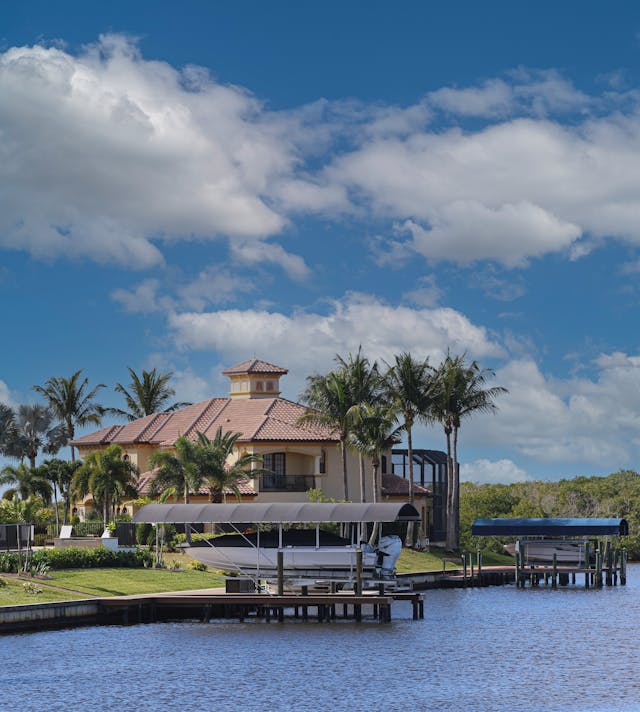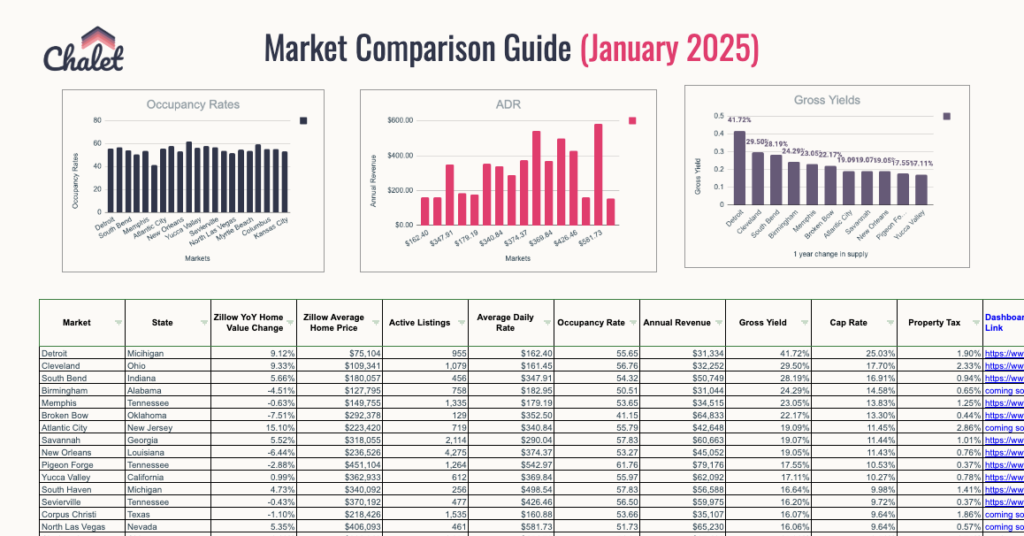Last updated: February 2025
Comprehensive FAQs for Short-Term Rental (STR) Regulations in Cape Coral, FL
Investing in short-term rental (STR) properties requires an in-depth understanding of local regulations. Below is a comprehensive list of frequently asked questions (FAQs) for STR operators and investors to help you navigate the rules in Cape Coral and stay compliant while maximizing profitability.

1. What is considered a short-term rental in Cape Coral?
In Cape Coral, a Residential Rental Property is defined as a dwelling unit located in a residential structure containing four or fewer individual dwelling units that is leased or rented to another person or entity. This does not include owner-occupied units, properties owned by federal, state, or local housing programs, hotels, motels, state-licensed community residential facilities, or public lodging establishments as defined under Florida law, except for vacation rentals as specified in Section 509.242 of the Florida Statutes.
2. Do I need a permit to operate a short-term rental in Cape Coral?
Yes, all residential rental properties in Cape Coral, defined as residential structures with four units or fewer that are leased or rented, must be registered with the city’s Code Compliance Division. This includes single-family homes and each unit within a multi-unit structure. There is a one-time registration fee of $35. Exemptions apply for properties owned by federal, state, or local housing programs, HUD, hotels, motels, and state-licensed community residential facilities that are not owner-occupied. Property owners must keep their contact information current with the Department of Development Services Code Compliance Division and notify them of any changes within 30 days. Failure to register is considered a violation and may lead to code enforcement action.
3. What are the zoning laws for STRs in Cape Coral?
The zoning laws in Cape Coral regulate residential rental properties within specific zoning districts. While there is no specific mention of restrictions unique to short-term rentals in the provided resources, all residential rental properties must comply with the zoning regulations and land use codes as stipulated by the city. You can find detailed information on zoning districts and regulations by contacting the Cape Coral Department of Community Development or visiting their zoning information page.
4. Are there occupancy limits for short-term rentals in Cape Coral?
Yes, Cape Coral imposes occupancy limits for residential rental properties based on the standards outlined in the city’s adopted International Property Maintenance Code.
Specifically:
- Bedrooms must meet certain requirements regarding accessibility and use.
- Kitchens and uninhabitable spaces cannot be used for sleeping purposes.
- Bedrooms must not serve as the only means of access to other habitable spaces or as the sole exit from other rooms. This indicates that each dwelling must ensure sufficient compliance with safety and structural standards
According to the International Property Maintenance Code (IPMC), which Cape Coral adheres to, occupancy limits generally follow these guidelines:
- Minimum area requirements for bedrooms: A bedroom occupied by one person must have at least 70 square feet of floor area. For two or more people, the room must provide at least 50 square feet per person.
- General occupancy limits per bedroom: Typically, this means that each bedroom should accommodate no more than two people, depending on the room’s size and compliance with the minimum square footage and safety regulations.
5. What taxes are short-term rental hosts required to pay in Cape Coral?
Short-term rental hosts in Cape Coral, located within Lee County, must comply with both state and local tax obligations. Airbnb automatically collects and remits the 5% Lee County Tourist Development Tax (TDT) on behalf of hosts for reservations of 182 nights or fewer.
Additionally, guests booking short-term rentals in Florida are subject to the Florida Transient Rental Tax of 6% on the listing price (including any cleaning fees) for stays of 182 nights or fewer, as well as the Florida Discretionary Sales Surtax, which varies by county and ranges from 0.5% to 1.5%. As of January 1, 2024, Lee County imposes a 0.5% discretionary sales surtax. While Airbnb may collect and remit some of these taxes, hosts must ensure they are compliant with any other applicable state or local taxes beyond what is collected by the platform.
Top 100 Airbnb Rental Markets

Instantly compare top 100 short-term (Airbnb) rental markets in the US
6. What are the safety and health requirements for STR properties in Cape Coral?
Short-term rental properties in Cape Coral must adhere to a range of safety and health standards, as outlined in the International Property Maintenance Code adopted by the city.
These include:
- Proper installation and maintenance of plumbing, heating, electrical, and mechanical systems.
- Sanitation requirements for exterior and interior conditions, such as maintaining structural elements and ensuring proper drainage.
- Compliance with emergency escape and egress requirements for all habitable spacess.
For a complete checklist of health and safety standards, consult the Code of Ordinances available here.
7. How are noise and nuisance complaints handled in Cape Coral?
Noise and nuisance complaints for residential rental properties in Cape Coral must be addressed promptly. Property owners are expected to ensure their properties are not a source of disturbance. Failure to comply with local noise ordinances or respond to complaints may lead to code enforcement actions.
8. Can I manage multiple short-term rental properties in Cape Coral?
Yes, property owners can manage multiple short-term rental properties, provided that each property is properly registered with the Department of Community Development in Cape Coral. Registration must be maintained for each unit, and owners must comply with all local ordinances, including maintaining accurate contact information and responding to violations promptly
9. What are the penalties for non-compliance with STR regulations in Cape Coral?
Failure to comply with the residential rental property registration requirements in Cape Coral or any other applicable regulations can result in violations subject to the city’s code enforcement provisions. Penalties may include fines, administrative fees, or other corrective actions as outlined in Sections 2-81 through 2-96 of the Cape Coral Code of Ordinances.
- Fines: For each day a violation continues past the correction deadline, fines may be imposed up to $250 per day for a first-time offense and up to $500 per day for repeat offenses.
- Liens: Unpaid fines can result in a lien against the property, potentially leading to foreclosure if unresolved.
- Additional Costs: Administrative fees and costs associated with enforcement actions may also be assessed to the property owner.
10. Are there any updates or changes to Cape Coral’s STR regulations I should be aware of?
The existing Residential Rental Property Registration Ordinance (Ordinance No. 19-17) for Cape Coral was adopted on March 17, 2021. This legislation established the requirement for all residential rental properties with four or fewer units to register with the city, ensuring compliance with local regulations and promoting neighborhood standards.
While the latest updates to the Code of Ordinances were made on November 8, 2024, these were not related to short-term rentals, but vehicle towing maximum prices, self-storage facilities and water management.
11. Can I self-manage my short-term rental, or do I need a property management company in Cape Coral?
Yes, property owners may self-manage their rentals but must adhere to all applicable regulations, including registration and compliance requirements.
12. What are the insurance requirements for short-term rentals in Cape Coral?
In Cape Coral, Florida, short-term rental operators are required to maintain liability insurance coverage with minimum limits of $1 million per occurrence and $2 million aggregate. This requirement ensures that property owners are adequately protected against potential claims arising from their rental activities. It’s essential for hosts to secure appropriate insurance policies that meet or exceed these minimum coverage amounts to comply with local regulations and safeguard their assets.
13. Are there any local rules regarding hosting platforms (e.g., Airbnb, Vrbo) in Cape Coral?
Hosts using platforms such as Airbnb and Vrbo must ensure their properties are registered with the city and adhere to local regulations. All short-term rental properties must be registered with the city’s Department of Community Development, regardless of the platform used for listing. Hosts must ensure that their properties comply with all local ordinances, including zoning regulations, health and safety standards, and tax obligations. Additionally, while platforms like Airbnb may handle some aspects of tax collection (such as tourist development tax in Lee County), hosts are ultimately responsible for ensuring full compliance with all local and state tax requirements.
14. What are the inspection requirements for STRs in Big Bear Lake?
All properties, including short-term rentals, must comply with applicable safety and building codes as outlined by the city, including adherence to the International Property Maintenance Code. This implies that residential rental properties may be subject to inspections to ensure compliance with health, safety, and structural standards.
Property owners should ensure their properties are well-maintained and meet all city regulations, and it is advisable to check directly with the city’s Code Compliance Division (code@capecoral.gov) or the Department of Community Development (cd@capecoral.gov) for any specific inspection requirements or processes.
15. Are there any neighborhood-specific restrictions for STRs in Cape Coral?
Certain neighborhood or zoning-based restrictions may apply. Property owners should verify with city planning officials. Additionally, it is important for property owners to review any applicable Homeowners’ Association (HOA) rules and deed restrictions in their area, as these may impose additional requirements or limitations beyond city ordinances.
You can access zoning maps and information directly from the Cape Coral government website at City of Cape Coral Zoning and Planning. This resource provides zoning maps, ordinances, and contact information for further assistance.
For specific inquiries or to ensure compliance with zoning regulations for your rental property, it’s recommended to reach out directly to their office:
- Phone: (239) 574-0553 (General contact for Community Development)
- Address: City of Cape Coral Department of Community Development, 1015 Cultural Park Blvd, Cape Coral, FL 33990
16. Is there a cap on the number of STR permits issued in Big Bear Lake?
As of the information available in January 2025, there are no specified limits on the number of registered residential rental properties allowed within the city; however, specific neighborhood or zoning restrictions may impact property eligibility.
17. What parking requirements exist for STRs in Cape Coral?
All properties, including rental properties, must comply with general parking regulations established by the city’s code and zoning ordinances, which typically govern the number of off-street parking spaces required based on property type and use.
Here are key aspects typically relevant to residential rental properties:
- Off-Street Parking: Cape Coral’s zoning regulations generally require that residential properties, including rentals, provide adequate off-street parking spaces. The exact number of required spaces may depend on factors such as the type and size of the dwelling.
- Blocking Public Rights-of-Way: Vehicles belonging to guests or tenants must not block sidewalks, driveways, or public rights-of-way. Ensuring compliance with general parking ordinances and safety measures is necessary.
- Zoning-Specific Regulations: The parking requirements may vary based on the specific zoning district in which the rental property is located. For example, some zoning areas may have stricter regulations related to parking due to density or neighborhood considerations.
For precise details or if you have further questions about how these regulations apply specifically to short-term rentals, it is advisable to contact Cape Coral’s Department of Community Development or review zoning ordinances specific to parking on their zoning webpage.

